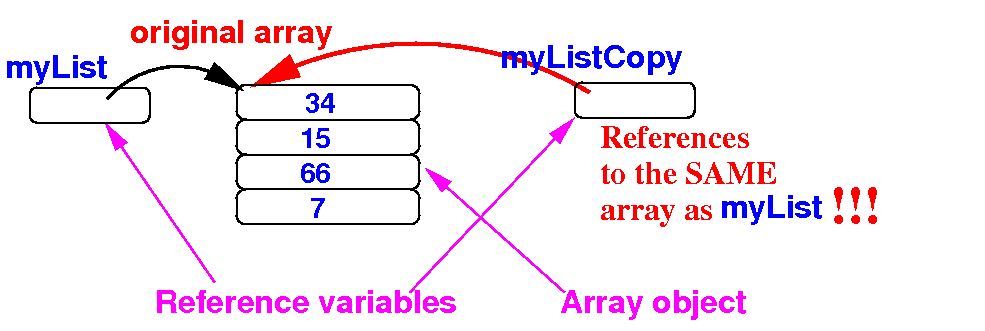Defining array variables
in Java
- Syntax to
define an
array (reference) variable:
dataType[] arrayRefVar; // Defines an array reference variable
|
- Syntax to
create an
array object:
new dataType[N]; // Create an array of N elements
|
- Properties of
an array in
Java:
- All elements in the
array have the
same
data type.
- Array elements are
stored
consecutively in
memory
|
- Example: define an
array
of
10
int variables
int[] A;
A = new int[10];
|
|
What happens
inside the computer when you
define an
array
The following diagrams show
what happens
inside the computer system:
int[] A; // A is a reference variable !
A = new int[10];
|
"int[] A" will
allocate (reserve memory)
a reference variable
A:
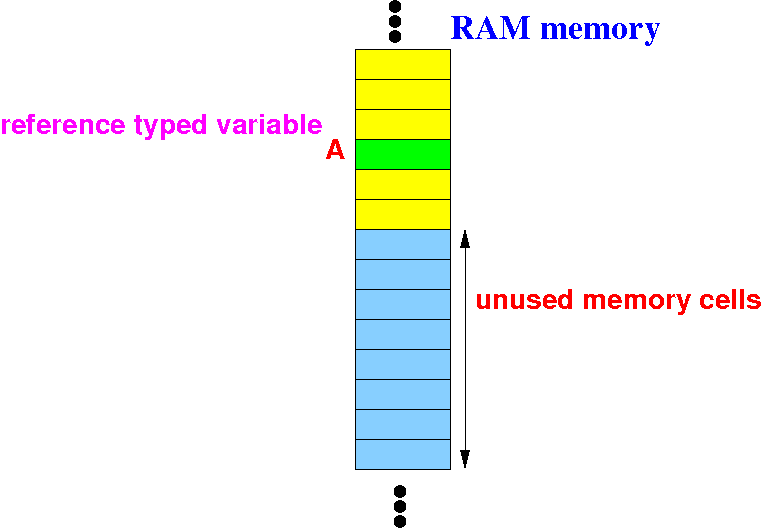
What happens
inside the computer when you
define an
array
The following diagrams show
what happens
inside the computer system:
int[] A; // A is a reference variable !
A = new int[10];
|
"new int[10]"
will
allocate (reserve memory)
for an int[10] array (= 40 bytes)
and
return
its base address:
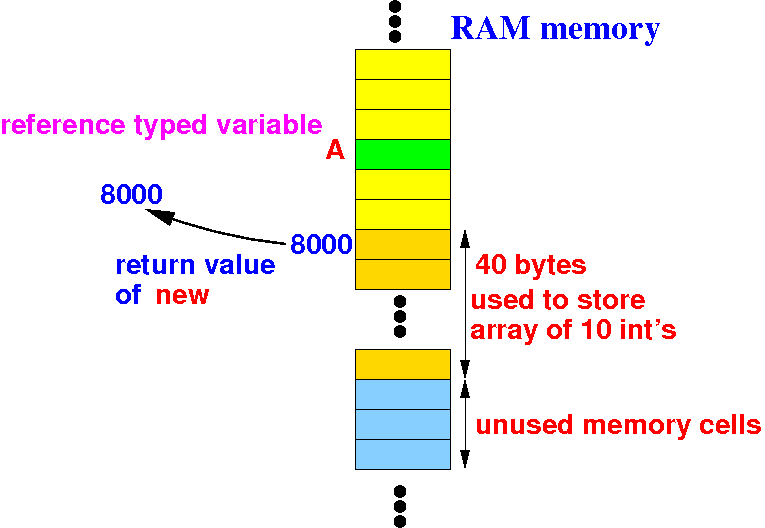
What happens
inside the computer when you
define an
array
The following diagrams show
what happens
inside the computer system:
int[] A; // A is a reference variable !
A = new int[10];
|
"A = " will
assign
the return value
to the variable A:
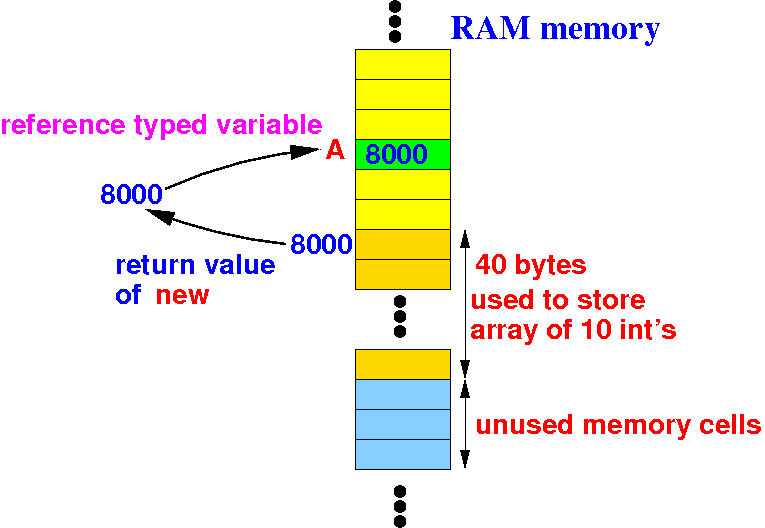
What happens
inside the computer when you
define an
array
Summary of the
effect of:
int[] A; // A is a reference variable !
A = new int[10];
|
The reference variable A will
point
to a newly created int[10]
(array of 10 integers) object:
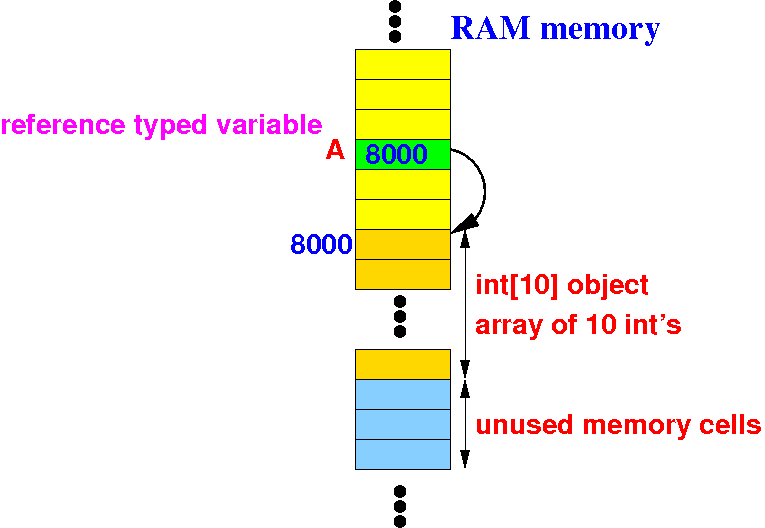
Copying
an array
- Copy an
array means:
- Make a duplicate of
an array where
the duplicate
contains
the same data as
the original
-
Updating
array elements
in the duplicate
must not affect
the data in the original array
|
- Schematically:
situation
before
making a copy of the
array myList
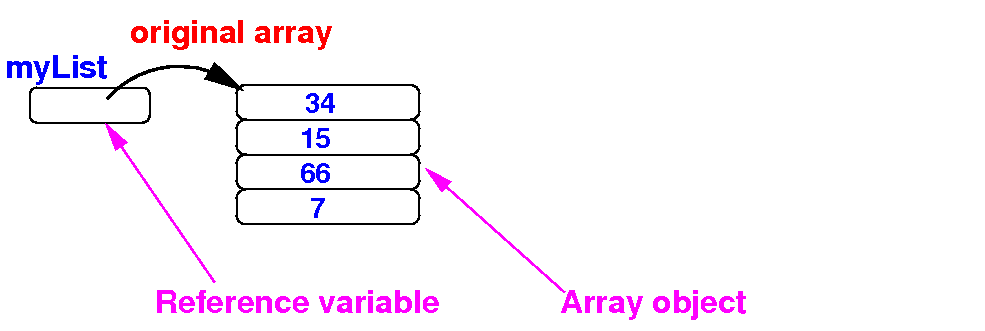
|
Copying
an array
- Copy an
array means:
- Make a duplicate of
an array where
the duplicate
contains
the same data as
the original
-
Updating
array elements
in the duplicate
must not affect
the data in the original array
|
- Schematically: situtaion
after
making a copy of the
array myList
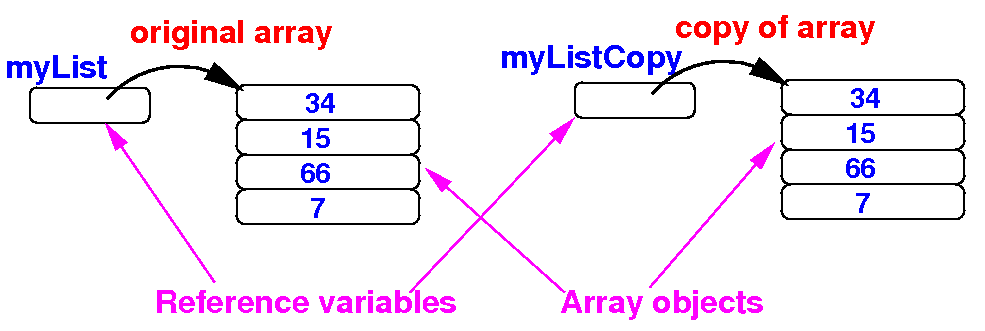
|
How to
copy an array in
Java
step-by-step instructions
- Initial state:

public static void main(String[] args)
{
double[] myList = {34, 15, 66, 7};
double[] myListCopy = new double[ myList.length ];
for ( int i = 0; i < myList.length; i++ )
myListCopy[i] = myList[i];
}
|
|
How to
copy an array in
Java
step-by-step instructions
- Step 1:
create an
array to
store the
copy
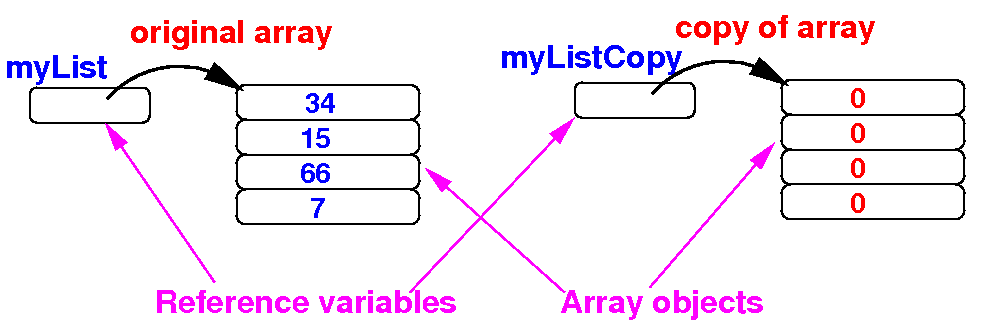
public static void main(String[] args)
{
double[] myList = {34, 15, 66, 7};
double[] myListCopy = new double[ myList.length ];
for ( int i = 0; i < myList.length; i++ )
myListCopy[i] = myList[i];
}
|
|
How to
copy an array in
Java
step-by-step instructions
- Step 2:
copy the
array elements to
the
copy array
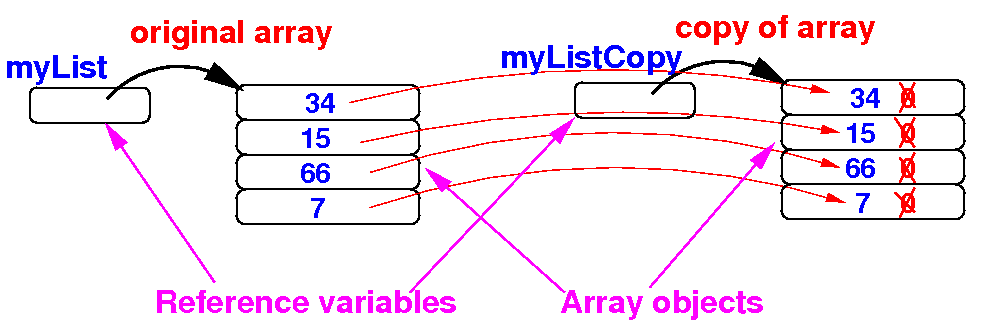
public static void main(String[] args)
{
double[] myList = {34, 15, 66, 7};
double[] myListCopy = new double[ myList.length ];
for ( int i = 0; i < myList.length; i++ )
myListCopy[i] = myList[i];
}
|
|
DEMO:
demo/02-review/CopyArray.java
A
common error
in array copy
- Variables of
primitive data types
(such as int,
double, etc)
can be
copied with
an
assignment:
int x = 4;
int xCopy;
xCopy = x; // Copies x to xCopy
|
- However,
in Java,
the
assignment operation will
not
copy
objects of
non-primitive
data types:
double[] myList = {34, 15, 66, 7};
double[] myListCopy;
myListCopy = myList; // Does not copy an array object
// ** This copies the reference
// ** in myList to myListCopy
|
|
The effect of
assignment
with a
reference variable
- Initially we
have the array
myList:
double[] myList = {34, 15, 66, 7};
|
Schematically:

|
The effect of
assignment
with a
reference variable
- The definition
double[]
myListCopy
defines
another
reference variable:
double[] myList = {34, 15, 66, 7};
double[] myListCopy;
|
Schematically:
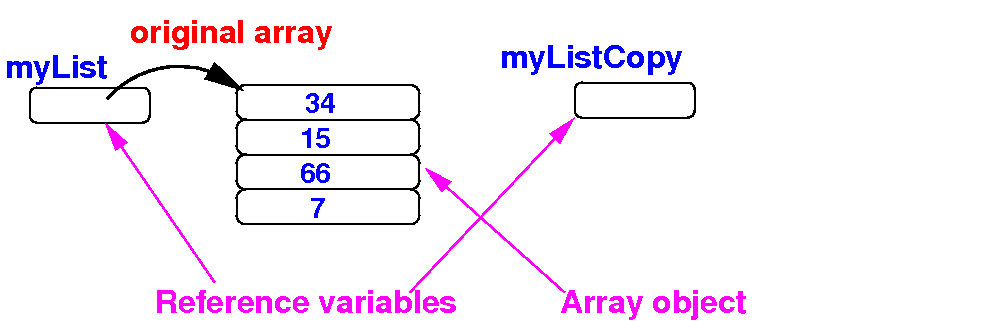
|
The effect of
assignment
with a
reference variable
The effect of
assignment
with a
reference variable
- Because
myListCopy
and myList
reference the
same
array object,
updates made with
myListCopy[i]
will
also affect
myList[i] and
vice verse:
public class Alias
{
public static void main(String[] args)
{
double[] myList = {34, 15, 66, 7};
double[] myListCopy;
myListCopy = myList; // Does not copy an array object
myListCopy[1] = 999; // Update will also affect myList[1]
for ( int i = 0; i < myList.length; i++ )
System.out.print( myList[i] + " " );
}
}
|
|
Demo:
demo/02-review/Alias.java
Alias
- We saw in the
last example that:
myListCopy[1]
and
myList[1]
were the
different names for
the
same (array)
variable:
public static void main(String[] args)
{
double[] myList = {34, 15, 66, 7};
double[] myListCopy;
myListCopy = myList; // Does not copy an array object
myListCopy[1] = 999; // Update will also affect myList[1]
}
|
-
Alias:
- When a
different variable
names
can be used to
reference the
same variable, they are
called
aliases
in computer science
|
|
❮
❯









